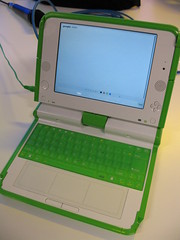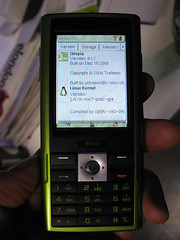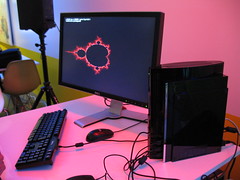They had various speakers who came in, bringing in variously interesting Linux-based projects, talking (very) briefly about them and then letting people poke around with them.
 They had some people from the One Laptop Per Child project, who brought along two prototypes of the US$100 laptops which they are going to build and distribute to children in the developing world. The machines are very well designed (they're full of innovative design features, they're reportedly almost indestructable, and they look desirably good); they're based on Linux and Python, look nothing like the machines used elsewhere, and are designed to encourage tinkering and exploration. They even have a key (labelled with a graphic of a cog) which, when pressed, takes you to the source code for the currently running program so you can hack and modify it. (That didn't seem to be working on the laptop I looked at, though that prototype wasn't working perfectly.)
They had some people from the One Laptop Per Child project, who brought along two prototypes of the US$100 laptops which they are going to build and distribute to children in the developing world. The machines are very well designed (they're full of innovative design features, they're reportedly almost indestructable, and they look desirably good); they're based on Linux and Python, look nothing like the machines used elsewhere, and are designed to encourage tinkering and exploration. They even have a key (labelled with a graphic of a cog) which, when pressed, takes you to the source code for the currently running program so you can hack and modify it. (That didn't seem to be working on the laptop I looked at, though that prototype wasn't working perfectly.)
 Someone also brought along a Trolltech Greenphone; that's a new mobile phone, created by Trolltech (the Norwegian company that makes the Qt toolkit (a rather elegant GUI library) and the Qtopia interface for portable devices), and based entirely on open-source(ish) software. It looked much like a regular phone, albeit with some developer features. I saw no evidence of it containing WiFi, though, so it may be lacking in that department.
Someone also brought along a Trolltech Greenphone; that's a new mobile phone, created by Trolltech (the Norwegian company that makes the Qt toolkit (a rather elegant GUI library) and the Qtopia interface for portable devices), and based entirely on open-source(ish) software. It looked much like a regular phone, albeit with some developer features. I saw no evidence of it containing WiFi, though, so it may be lacking in that department.
Sony sent along a representative with a PS3 console, to show that it could boot Linux (and not only from special Sony-approved distributions, as the PS2 could, but from any distribution of your choice). Of course, the catch is that when the PS3 boots an untrusted Linux disc of your own providing, it runs it in a sandbox (under a Xen-style hypervisor), isolating it completely from the nifty graphics chip (so that game developers can't evade Sony's game-licensing fees by distributing full-featured games as bootable Linux live DVDs), and reducing it to a generic computer with a somewhat unusual CPU.
 They had a demo, which rendered a Mandelbrot set and let you zoom around on it; it was like a faster version of something I saw on a 386 PC in 1989. All in all, I found this demo underwhelming; when asked why anyone would want to run Linux in a sandbox on a PS3 when one could build a PC for less and get access to better graphics capabilities, the Sony rep didn't have a good answer; it was intended, she said, for people who already have a PS3 and, for some reason, are seized with the desire to run Linux on it. Though I suspect that, the fact that doing so doesn't involve breaking locks or using the hardware for anything more than it was designed for (the fact that the PS3 can be a mediocre Linux box is about as exciting as the fact that an iPod can be a mediocre PDA, or a mobile phone can be a mediocre MP3 player), will largely leach any such endeavour of any hack value it may have had.
They had a demo, which rendered a Mandelbrot set and let you zoom around on it; it was like a faster version of something I saw on a 386 PC in 1989. All in all, I found this demo underwhelming; when asked why anyone would want to run Linux in a sandbox on a PS3 when one could build a PC for less and get access to better graphics capabilities, the Sony rep didn't have a good answer; it was intended, she said, for people who already have a PS3 and, for some reason, are seized with the desire to run Linux on it. Though I suspect that, the fact that doing so doesn't involve breaking locks or using the hardware for anything more than it was designed for (the fact that the PS3 can be a mediocre Linux box is about as exciting as the fact that an iPod can be a mediocre PDA, or a mobile phone can be a mediocre MP3 player), will largely leach any such endeavour of any hack value it may have had.